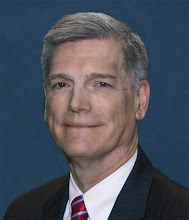 Senators Obama and McCain participated in the first of the Presidential debates on Friday night. Although planned to focus on foreign policy, the debate covered a range of topics with significant domestic importance, including energy policy. Nuclear energy was mentioned at three points in the discussion of energy policy. The first mention came from Senator McCain:
Senators Obama and McCain participated in the first of the Presidential debates on Friday night. Although planned to focus on foreign policy, the debate covered a range of topics with significant domestic importance, including energy policy. Nuclear energy was mentioned at three points in the discussion of energy policy. The first mention came from Senator McCain:MCCAIN: Look, we are sending $700 billion a year overseas to countries that don't like us very much. Some of that money ends up in the hands of terrorist organizations. We have to have wind, tide, solar, natural gas, flex fuel cars and all that but we also have to have offshore drilling and we also have to have nuclear power. Senator Obama opposes both storing and reprocessing of spent nuclear fuel. You can't get there from here and the fact is that we can create 700,000 jobs by building constructing 45 new nuclear power plants by the year 2030. Nuclear power is not only important as far as eliminating our dependence on foreign oil but it's also responsibility as far as climate change is concerned and the issue I have been involved in for many, many years and I'm proud of the work of the work that I've done there along with President Clinton.The second mention came from Senator Obama, following up a question about Russian intervention in Georgia:
OBAMA: The second point I want to make is -- is the issue of energy. Russia is in part resurgent and Putin is feeling powerful because of petro-dollars, as Senator McCain mentioned. That means that we, as one of the biggest consumers of oil -- 25 percent of the world's oil -- have to have an energy strategy not just to deal with Russia, but to deal with many of the rogue states we've talked about, Iran, Venezuela.And that means, yes, increasing domestic production and off-shore drilling, but we only have 3 percent of the world's oil supplies and we use 25 percent of the world's oil. So we can't simply drill our way out of the problem. What we're going to have to do is to approach it through alternative energy, like solar, and wind, and biodiesel, and, yes, nuclear energy, clean-coal technology. And, you know, I've got a plan for us to make a significant investment over the next 10 years to do that. And I have to say, Senator McCain and I, I think agree on the importance of energy, but Senator McCain mentioned earlier the importance of looking at a record.The third mention came from both candidates in the closing minutes of the debate:
MCCAIN: No one from Arizona is against solar. And Senator Obama says he's for nuclear, but he's against reprocessing and he's against storing. So...Being mentioned at a Presidential debate is encouraging for those of us who believe nuclear energy can and should be an important part of the nation's energy future. Only time will tell whether these utterances influence the election and, whoever wins, lead to a national energy policy and laws that enable nuclear energy to shoulder an even greater amount of the nation's energy load. For now, we have a measure of what was on the candidates' minds last night and that will have to do.
OBAMA: That's just not true, John. John, I'm sorry, but that's not true.
MCCAIN: ... it's hard to get there from here. And off-shore drilling is also something that is very important and it is a bridge.
And we know that, if we drill off-shore and exploit a lot of these reserves, it will help, at temporarily, relieve our energy requirements. And it will have, I think, an important effect on the price of a barrel of oil.
OBAMA: I just have to respond very quickly, just to correct -- just to correct the record.
MCCAIN: So I want to say that, with the Nunn-Lugar thing...
LEHRER [Moderator Jim Lehrer of PBS]: Excuse me, Senator.
OBAMA: John?
MCCAIN: ... I supported Nunn-Lugar back in the early 1990s when a lot of my colleagues didn't. That was the key legislation at the time and put us on the road to eliminating this issue of nuclear waste and the nuclear fuel that has to be taken care of.
OBAMA: I -- I just have to correct the record here. I have never said that I object to nuclear waste. What I've said is that we have to store it safely.
And, Senator McCain, he says -- he talks about Arizona.
LEHRER: All right.
OBAMA: I've got to make this point, Jim.
LEHRER: OK.
OBAMA: He objects...
MCCAIN: I have voted for alternate fuel all of my time...
OBAMA: He -- he -- he objects...
(CROSSTALK)
LEHRER: One at a time, please.
OBAMA: He objected...
LEHRER: One at a time.
MCCAIN: No one can be opposed to alternate energy.
OBAMA: All right, fair enough. Let's move on.
The Washington Post has full video of the debate. The IHT has a complete transcript here.

Comments
Anyone?
Obama should come more openly on his stance on nuclear energy. It will clear the minds of a lot of people.